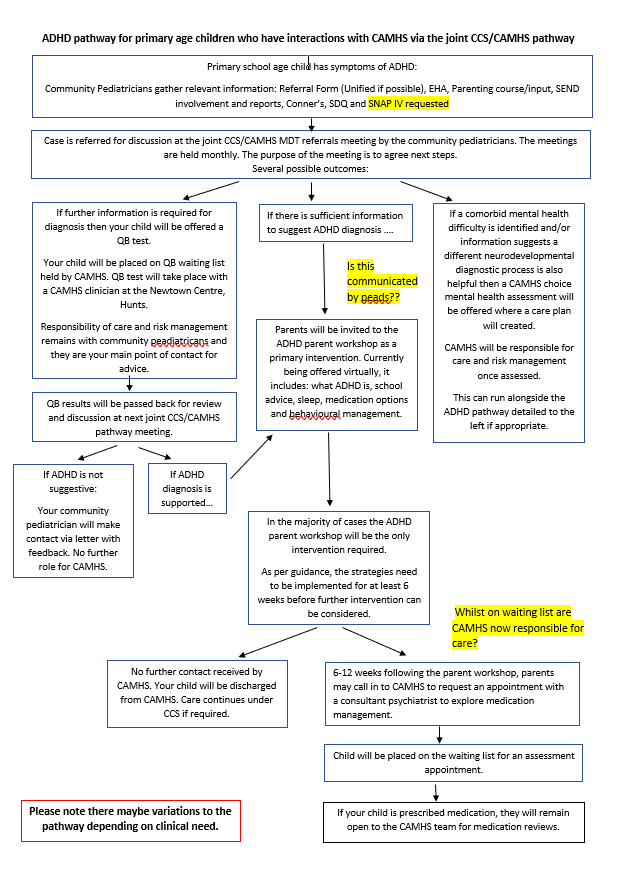Autism and ADHD – referral, assessment & support
Autism/ADHD referrals and support
How it works and where to find help
The process for seeking a referral for a potential diagnosis in Cambridgeshire depends on the age of the child. The NHS publish their information on their website here.
Where children are in school (nursery, primary or secondary) or a setting (pre-school, college) there is guidance for how professionals can make a referral.
As a parent carer you can ask school or setting to make referral or ask your GP. You could decide to seek a private assessment. Whatever route you take do share your concerns and worries with the professionals that are involved with your child / family so that they can offer help and support.
With or without a diagnosis your child will still have needs.
It would be reasonable to expect schools and settings to address these – indeed it is a legal requirement, although exactly how the needs are met are not specified (for those who do not have an Education Health and Care Plan [ECHP] and who are on SEN Support). Where there is an ECHP, then how the needs are met will need to be written into the Plan and the law says the Plan must be delivered as its written.
And with or without a diagnosis, children and parent carers will still need support to address and manage the needs as they relate to the child. All children are individuals and there is no one size fits all solution. Many parent carers will tell you it can mean trying things out to find what is useful to you and your child. But there is a lot of support available.
Pinpoint offer Autism/ADHD sessions which are free – you don’t need a diagnosis to access them, just pick the ones that you think are relevant to your needs. You can book free tickets on the events section of our website.
Private Assessments
Please note that Pinpoint are unable to recommend individuals for private assessments as we are unable to quality assure them. We recommend that you ensure that whoever you may approach for a private assessment is suitably qualified and accredited by a relevant organisation.
Early Identification of Autism Project (EIA)
The EIA is a project that Cambridgeshire SEND service and the Opportunity Area have been involved with alongside colleagues in Bradford, Nottingham, Oldham and Manchester University . Cambridgeshire were successful in obtaining a DFE grant to fund this work.
Cambridgeshire’s project focused on Girls with Autism and looked at early identification, referral routes and diagnosis pathways.
The project has now concluded but SEND services and Health are continuing to work with the other cross-country partners. They are currently delivering a pilot for a different diagnostic pathway. Some families will receive letters to be invited to the project and they are working through the waiting list as capacity allows. They hope that this will result in a faster and more comprehensive route for children and families. They are also using the remaining funding to support pre-diagnosis as they have heard from Pinpoint and SENDIASS that this is a concern for many parents. They will update when there are further news on the plans.
Requesting an Autism Assessment
How do I make a request?
Autism is diagnosis that can only be made by a suitably qualified medical professional.
Autism Spectrum Disorder and Social Communication Difficulties
Autism is diagnosis that can only be made by a suitably qualified medical professional. Children who do not have a diagnosis of autism may be diagnosed as having Social Communication Difficulties. Cambridgeshire NHS have produced a Guide.
In Cambridgeshire, this service is provided through the NHS by the Community Paediatrician or Clinical Psychologist for preschool and primary school-aged children 0 -11 years and the Child psychiatrist/psychologist (CAMH) for secondary school age, 11- 18 years. Young people over the age of 18 will be referred by their GP to adults’ mental health services and Cambridge Lifespan Autism Spectrum Service (CLASS)
Whilst you might have an assessment as part of an Education Health and Care Plan Assessment, an Autism Assessment can be done without one.
Our Handy Guide sets out how to make a request and what the process involves.
Requesting an ADHD Assessment
Making a request
ADHD is a medical diagnosis that can only be made by a suitably qualified medical professional.
In Cambridgeshire this is provided for the NHS by the Community Paediatric Team for primary school-aged children and the child psychiatrist (CAMH) for secondary school age. Referrals are through professionals working with the child: the school, a paediatrician or GP.
For adult (18 years and older) referrals you can contact Cambridgeshire’s NHS service.
If an assessment has been done by a private clinician, this should be submitted to the community paediatric department for inclusion in the Medical advice.
Whilst you might have an assessment as part of an Education Health and Care Plan Assessment, an ADHD Assessment can be done without one.
Our Handy Guide sets out how to make a request and what the process involves.
You may be asked to undertake a parenting course as part of the process, you can find out more here.
Please click on the flowchart below for a full version of the ADHD pathway for primary age children who have interactions with CAMHS via the joint CCS/CAMHS pathway:
Useful information if your child has Autism/ADHD
Visual Support information and resources
Does your child or young person like visual schedules/picture checklists for independent living skills, self care routines or managing feelings?
Visual supports are a communication tool that can be used with autistic people. They can be used in most situations, are adaptable and portable. You can make your own or buy kits which you can use for day-to-day routines, transitions, special events.
Find top tips and other visual support resources on the National Autistic Society website.

